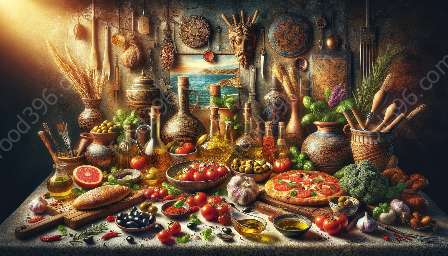Italian cuisine has a rich history rooted in centuries of tradition, cultural influences, and regional diversity. Its compatibility with Mediterranean cuisine and broader culinary history offers a fascinating perspective on the development of one of the world's most beloved culinary traditions.
The Origins of Italian Cuisine
Italian cuisine has its origins in ancient Roman, Etruscan, and Greek culinary practices, dating back to the 4th century BC. The Roman Empire played a significant role in shaping the foundations of Italian gastronomy, introducing ingredients such as olive oil, wine, and wheat to the Italian peninsula.
With the fall of the Roman Empire, Italy experienced a period of invasions and conquests by various civilizations, including the Byzantines, Arabs, and Normans. These interactions enriched Italian cuisine with new flavors, spices, and cooking techniques, leading to the evolution of distinct regional cuisines.
Regional Diversity and Influences
Italian cuisine is renowned for its regional diversity, with each region boasting its unique culinary traditions and specialties. The north of Italy is characterized by rich, creamy sauces, such as those found in risotto and polenta dishes, while the central regions are known for hearty pastas and bold flavors.
Southern Italian cuisine, heavily influenced by Mediterranean flavors, features an abundance of fresh seafood, tomatoes, and aromatic herbs. The coastal areas embrace the bounty of the sea, showcasing dishes like Sicilian seafood pasta and Neapolitan-style pizza, which have become iconic representations of Italian culinary excellence.
Mediterranean Influence and Commonalities
Italian cuisine shares a deep connection with Mediterranean culinary traditions, drawing inspiration from the surrounding regions of Greece, Spain, and North Africa. The extensive use of olive oil, fresh produce, and herbs reflects the shared heritage of the Mediterranean diet, emphasizing the importance of simple, seasonal ingredients and wholesome cooking methods.
Furthermore, the concept of the Mediterranean diet, which promotes a balanced and healthy approach to eating, aligns with the principles of Italian cuisine. Both emphasize the use of fresh vegetables, legumes, and whole grains, alongside moderate portions of fish, poultry, and dairy, contributing to the overall well-being and longevity of those who adopt this dietary lifestyle.
The Renaissance of Italian Cuisine
During the Renaissance period, Italian cuisine experienced a culinary revolution, marked by the emergence of groundbreaking cookbooks and the refinement of cooking techniques. Notably, the publication of 'L'Opera' by Bartolomeo Scappi in 1570 and 'Il Cuoco Galante' by Vincenzo Corrado in 1773 showcased the sophistication and diversity of Italian culinary artistry.
The Renaissance also saw the introduction of new ingredients from the Americas, such as tomatoes, potatoes, and peppers, which significantly influenced the development of Italian cuisine. The humble tomato, in particular, became a staple ingredient in various Italian dishes, transforming the culinary landscape and contributing to the creation of beloved classics like pasta al pomodoro and margherita pizza.
Modern Innovations and Global Influence
In the modern era, Italian cuisine has evolved and adapted to global culinary trends while retaining its deep-rooted traditions. Italian chefs and culinary experts have continued to push the boundaries of traditional recipes, incorporating contemporary influences and innovative techniques to create exciting new flavors and presentations.
As a result, Italian cuisine has gained worldwide acclaim, influencing and inspiring chefs and food enthusiasts from diverse cultural backgrounds. The global popularity of Italian dishes, such as spaghetti carbonara, tiramisu, and gelato, underscores the enduring appeal and universal appeal of this internationally beloved culinary tradition.
Preserving Tradition and Authenticity
Despite the modernization and global expansion of Italian cuisine, preserving tradition and authenticity remains a core value for Italian chefs and culinary enthusiasts. The protection of traditional regional recipes, the safeguarding of artisanal food products, and the promotion of sustainable agriculture are integral to maintaining the integrity and heritage of Italian gastronomy.
Moreover, Italy's designation of protected geographical indications (PGI) and protected designation of origin (PDO) for food and wine products underscores the country's commitment to preserving authentic culinary traditions and promoting local agricultural heritage.
Conclusion
Italian cuisine's rich history, regional diversity, and compatibility with Mediterranean culinary traditions offer a captivating narrative that reflects the cultural, societal, and historical influences that have shaped this revered gastronomic heritage. From the ancient culinary practices of the Roman Empire to the modern innovations of contemporary Italian chefs, the story of Italian cuisine is a testament to the enduring legacy of one of the world's most cherished and influential culinary traditions.

